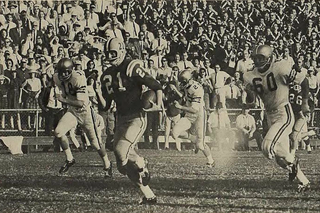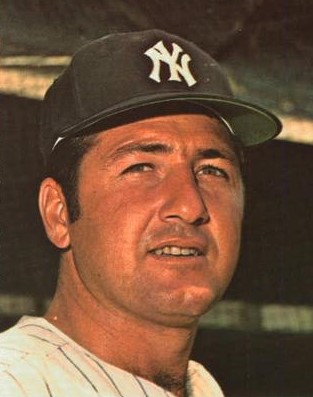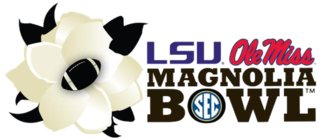
William Abb Cannon Sr. was an American football halfback, fullback and tight end who played professionally in the American Football League (AFL) and the National Football League (NFL). He attended Louisiana State University (LSU), where he played college football as a halfback, return specialist, and safety for the LSU Tigers. At LSU, Cannon was twice named a unanimous All-American, helped the 1958 LSU team win a national championship, and received the Heisman Trophy as the nation's most outstanding college player in 1959. His punt return against Ole Miss on Halloween night in 1959 is considered by fans and sportswriters to be one of the most famous plays in LSU sports history.

Charles Youmans McClendon, also known as "Cholly Mac", was an American college football player and coach. He served at the head football coach at Louisiana State University (LSU) from 1962 to 1979, compiling a record of 137–59–7. McClendon was inducted into the College Football Hall of Fame as a coach in 1986.

Jerry Lane Stovall , nicknamed "Mr. Everything", is an American former football player, coach, and college athletics administrator. He played college football for the LSU Tigers, where he was a unanimous selection to the 1962 College Football All-America Team as a halfback. Stovall played professionally as a safety and punter in the National Football League (NFL) with the St. Louis Cardinals from 1963 to 1971. Stovall served as the head football coach at his alma mater, LSU, from 1980 to 1983, compiling a record of 22–21–2 in four seasons and leading the 1982 team to an appearance in the 1983 Orange Bowl. He was the athletic director at Louisiana Tech University from 1990 to 1993. He is the only player in LSU history to be named a unanimous All-American (1962), be selected to the college football hall of fame (2010), be selected as a first round pick (1963), and to be selected to the pro bowl.

The LSU Tigers football program, also known as the Fighting Tigers, represents Louisiana State University in college football. The Tigers compete in the Football Bowl Subdivision (FBS) of the National Collegiate Athletic Association (NCAA) and the Western Division of the Southeastern Conference (SEC).

Jerry Dean "Jake" Gibbs is an American former Major League Baseball player who played for the New York Yankees as a platoon catcher from 1962 to 1971. Although Gibbs was the regular starting catcher for New York in 1967 and 1968, he was primarily a back-up for Elston Howard and then Thurman Munson at the tail-end of his career.

Paul Franklin Dietzel was an American college football player, coach, and athletics administrator. He served as the head coach at Louisiana State University (1955–1961), the United States Military Academy (1962–1965), and the University of South Carolina (1966–1974), compiling a career head coaching record of 109–95–5. Dietzel's 1958 LSU team concluded an 11–0 season with a win over Clemson in the Sugar Bowl and was a consensus national champion. For his efforts that year, Dietzel was named the National Coach of the Year by both the American Football Coaches Association and the Football Writers Association of America. Dietzel also served as the athletic director at South Carolina (1966–1974), Indiana University Bloomington (1977–1978), LSU (1978–1982), and Samford University (1985–1987).

The 1958 LSU Tigers football team represented Louisiana State University (LSU) in American football during the 1958 NCAA University Division football season. After finishing the season with a 10–0 record the team was named national champion by the Associated Press (AP) and the Coaches Poll (UPI).

The Ole Miss Rebels football program represents the University of Mississippi, also known as "Ole Miss". The Rebels compete in the Football Bowl Subdivision (FBS) of the National Collegiate Athletic Association (NCAA) and the Western Division of the Southeastern Conference (SEC). The Rebels play their home games at Vaught–Hemingway Stadium on the university's campus in Oxford, Mississippi.
The 1958 Florida Gators football team represented the University of Florida during the 1958 NCAA University Division football season. The season was the ninth of ten for Bob Woodruff as the head coach of the Florida Gators football team. Woodruff's 1958 Florida Gators finished with an overall record of 6–4–1 and a Southeastern Conference (SEC) record of 2–3–1, placing eighth in the twelve-member SEC.
The 1959 NCAA University Division football season saw Syracuse University crowned as the national champion by both final polls, the AP writers poll and the UPI coaches polls.
The 1959 Ole Miss Rebels football team represented the University of Mississippi during the 1959 NCAA University Division football season. Ole Miss finished the season with an overall record of ten wins and one loss (10–1), tied for second in the Southeastern Conference (SEC) and with a victory over LSU in the Sugar Bowl. The team gave up only 21 points all season, and were retroactively named national champions by Berryman, Billingsley, Dunkel and Sagarin. Syracuse was crowned as the national champion by both the AP and the UPI wire services. The team was later rated the third best squad from 1956 to 1995 by Sagarin.
The 1959 Sugar Bowl featured the top-ranked LSU Tigers and the 12th-ranked Clemson Tigers. LSU had already secured the national title, as the final editions of both major polls were released a month earlier in early December. With Heisman Trophy winner Billy Cannon at halfback, LSU was favored to win by fifteen points.
The 1960 Sugar Bowl to the featured the second-ranked Ole Miss Rebels, and the third ranked LSU Tigers. LSU was the defending national champion, playing in its home state, but faced a rematch of a tough 7–3 win in a regular season game.

The Magnolia Bowl is name given to the LSU–Ole Miss football rivalry. It is an American college football rivalry game played annually by the LSU Tigers football team of Louisiana State University (LSU) and the Ole Miss Rebels football team of the University of Mississippi. The teams compete for the Magnolia Bowl Trophy. The Tigers and the Rebels first met in 1894, and have been regular opponents in Southeastern Conference (SEC), meeting annually, without interruption, since 1945.
The 1962 Arkansas Razorbacks football team represented the University of Arkansas in the Southwest Conference (SWC) during the 1962 NCAA University Division football season. In their fifth year under head coach Frank Broyles, the Razorbacks compiled a 9–2 record, finished in second place in the SWC, and outscored all opponents by a combined total of 299 to 115. The Razorbacks' only loss during the regular season came against Texas by a 7–3 score. The team was ranked #6 in both the final AP Poll and the final UPI Coaches Poll and went on to lose to Ole Miss in the 1963 Sugar Bowl by a 17–13 score.

Michael Ray Mangham was an American football player for the LSU Tigers from 1958 to 1960. He played at the end position on both offense and defense and was selected as an Academic All-America and All-SEC player. He is most remembered for catching the winning touchdown pass in the Sugar Bowl on January 1, 1959, to give LSU the national championship for the 1958 NCAA University Division football season.

During a college football game on Halloween night in 1959, Billy Cannon of Louisiana State University (LSU) returned a punt 89 yards for a touchdown against the Ole Miss Rebels. The return occurred late in the fourth quarter and provided the only touchdown scored in the game, as the Tigers won 7–3. Featuring several broken tackles, it was a signature play of Cannon's Heisman Trophy-winning season and a notable moment in the LSU–Ole Miss football rivalry.

The 1936 LSU Tigers football team was an American football team that represented Louisiana State University (LSU) as a member of the Southeastern Conference (SEC) during the 1936 college football season. In their second year under head coach Bernie Moore, the Tigers complied an overall record of 9–1–1, with a conference record of 6–0, and finished as SEC champion. LSU won their second consecutive Southeastern Conference championship and earned their second straight trip to the Sugar Bowl in New Orleans. The defense allowed only 33 points the entire season, which still ranks fourth in school history for the fewest points allowed by a Tiger defense.
The Chinese Bandits were the backup defensive unit on coach Paul Dietzel's LSU Tigers football teams, most notably the 1958 and 1959 teams. The name was also used briefly by the Army Cadets football team during Dietzel's coaching tenure at the U.S. Military Academy. At LSU, they made up the third unit of Dietzel's "three-platoon system." While they lacked experience and talent, the Bandits were notable for their tenacity and toughness. The unit was hugely popular among fans, and has since become part of LSU sports lore.
The LSU Tigers football team represents Louisiana State University in the sport of American football. The university has fielded a team every year since it began play in 1893, except in 1918 due to World War I. It has competed in the Southeastern Conference (SEC) since 1933, and in the conference's Western division since 1992. Previously, LSU was a member of the Southern Intercollegiate Athletic Association (SIAA) from 1896 to 1921 and the Southern Conference (SoCon) from 1922 to 1932. There have been 32 head coaches for the team, starting with Charles E. Coates in 1893. Since 2022, the head coach of the Tigers is Brian Kelly. LSU has played 1,221 games in its 123 seasons of play, and has compiled an all-time record of 772 wins, 405 losses, and 47 ties as of the end of the 2016 season.












